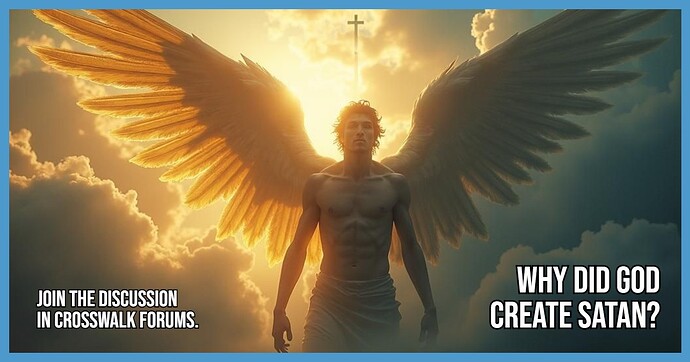Why does God create anyone? Or anything?
We know very little about the angels, the Leviathan, or Satan, and so on. And there may be a reason why so little information is in the Bible. The thing that is hidden can be anything until you know what it is.
There is a cosmology in the background that is referenced by people who were well aware of the stories and beliefs at the time the Scripture was recorded. The people of that time period were acquainted with it. We aren’t.
We grew some of the story in church history. The devil grew to resemble a pagan god of the shepherds, perhaps to parrallel the Shepherd. But it was just a copy and paste job. The question becomes, how much of what we know, or think we know, is actually copy and paste? And how much is an actual reference to something actual?
In science, quantim physics I think, it is believed that there must be a parallel universe for every single different possibility. Each path must have a universe to account for the direction. Every choice where something different could have happened gives birth to a new world where it did in fact happen. One could say that nothing is random with God because when God rolls the dice all the sides appear upright on each and every roll. But… does God always look at all the outcomes? He could, because God is God… But does He hide His face? Does He choose not to observe?
Perhaps both good and evil must exist, along with the Shepherd and the anti-shepherd. Maybe one for the sheep and one for the goats. Polar opposites rounding each other out.
Maybe the act of creation must come with an act of destruction, an equal but opposite action. Or a dualism, like man and woman from which a child can come into the world.
Or maybe the Light shines out and it gives life. This allows the world to be seen, to exist. But behind the world there is a shadow cast. This silhouette is born from the light touching the creation and cannot exist without either one. But the shadow is only a two dimensional after image with no depth. It can do nothing but adjust to the movement of the Light as it illuminates the Creation. It has no choice, no free will. Like a mirror image.
It is interesting- In the Old Testament it was said that the dead become shades, a word similar to shadow… And God said because of our sins, we would surely die. Death in its own way is a shadow to life.
And as Paul writes,
12 For now we see through a glass, darkly; but then face to face: now I know in part; but then shall I know even as also I am known
If we were the actual creation, if we were alive, would we not see clearly now as the light shines upon us?
Maybe we are not in fact the Creation but the shadow of what is real, striving to be born and made real. Or maybe with the fall, we all live in the valley of the dead and do not know it.
It is also said that observation is what decides the outcome. Once a result is seen, it cannot be reversed. Perhaps this is why God hides his face when His people fall. Or why Jesus said it was good he was not there when Lazarus died. (Though it is more likely because he could have healed the ailment before it got worse.) By not witnessing the death, the death can be reversed. Like Schrödinger’s cat in a box. Both alive and dead until the rock is rolled away and the result is seen.
By not witnessing something, God switches out the possibilities from a multitude of what might have been(s)
Or maybe the devil is just an arrogant narcisstic jerk. Who knows?
